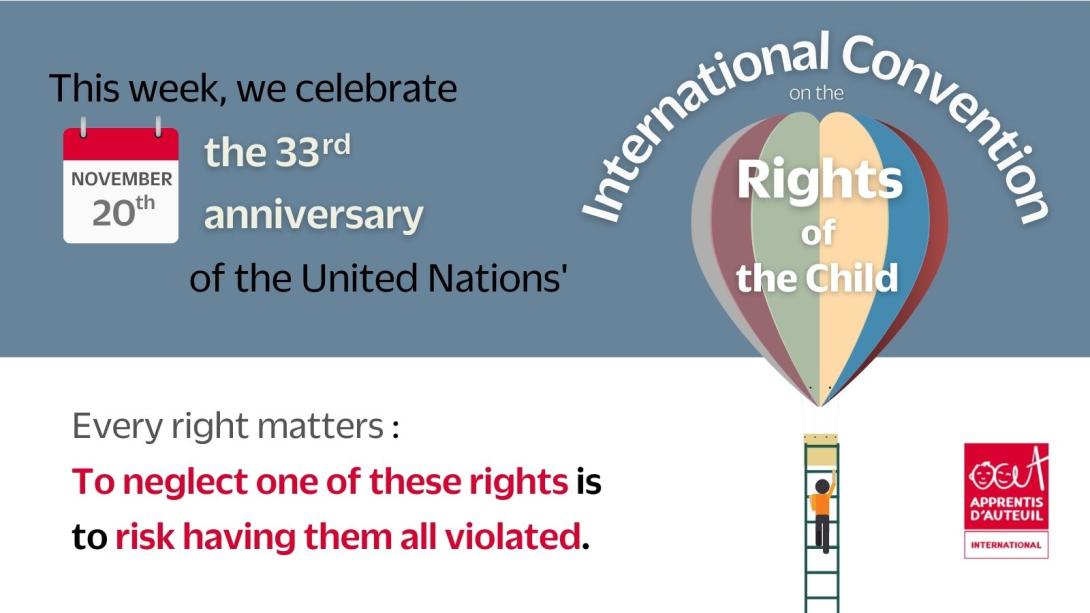

On the 20th November, we celebrate the 33rd anniversary of the International Convention on the Rights of the Child (CRC), adopted in 1989. Most ratified international treaty in history, this convention requires State Parties to establish and enforce laws and public policies that implement the rights of the child. This day offers an opportunity to reiterate the universal, undivided, and inalienable nature of these rights: ALL children have rights, and none of these rights can be fully exercised without the others.
WHAT DOES THIS MEAN IN PRACTICE?
Violating one of the fundamental rights of the children is not a trivial matter, and can have devastating impacts on the child, including in his or her adult life. If these rights are infringed regularly, it may have an impact comparable to the domino effect: a minor who does not have access to one of their rights may significantly diminish their chances of exercising their other rights.
This is what the experiences of our partners in the field have shown us.
Although the right to identity enshrined in article 8 of the CRC is recognised by 196 States worldwide, many do not give it any substance. Indeed, 1 in 4 births in the world are not registered. In societies where paperwork forms an integral part to everything we done more piece of paper might seem trivial, and yet... not having a birth certificate has serious consequences. In Madagascar, for example, 2.5 million children do not have a birth certificate. Without a legal status, they will not be able to access a legal job, get a driving licence, open a bank account, vote, or be enrolled at primary school.
The right to education is also stated in the CRC (Article 28), which specifies that it is not a luxury, but a fundamental right to escape from poverty to level out inequalities and to guarantee sustainable development. Thus, in many countries, education is supposed to be accessible and free for all children. However, in addition to existing administrative barriers, there are often additional costs associated with enrolment, such as school supplies, transport, lunch or sometimes uniforms, etc. As a result, a child in school often means greater financial loss for poor families. In Peru, 12% of children leave school before the age of 13, and 17% of those who remain will not complete secondary school. Why is this the case? Many have no choice but to work to support themselves and their families, thus missing out on not only on education through school, but also on food, health, civic issues and environmental education. Their future prospects are thus considerably reduced.
All children in the world also have the right to enjoy the highest attainable standard of health and therefore to have access to health services (article 24 of the CRC). Almost all states in the world have adopted legislation establishing free health care for minors. Nevertheless, in several countries, these laws are not applied. In Congo, for example, in order to have their children treated, families have to pay a contribution to the health centre, care must also be paid for and may be very expensive. Due to lack of resources, low-income households must go without treatment, which increases the risk of abuse and can sometimes lead to a sick child being abandoned. The repercussions are even more critical for children living on the streets who are denied access to health centres because they cannot afford to pay for their health care. It goes without saying that , access to recreation, or school success is extremely difficult when one is in poor health, and has no access to care or treatment.
Alongside our partners, Graines de Bitume, the NRJ Centre, H.A.R.D.I, ONG Manda, La Plateforme de la Société civile pour l'Enfance (PFSCE), Qosqo Maki, REIPER and many others, we work with these young people to put an end to rights violations, to overcome their difficulties so that they can build their future.
EVERY RIGHT MATTERS: TO NEGLECT ONE IS TO RISK SEEING THEM ALL VIOLATED.
We all have a role to play in ensuring that all children can unconditionally enjoy their rights.